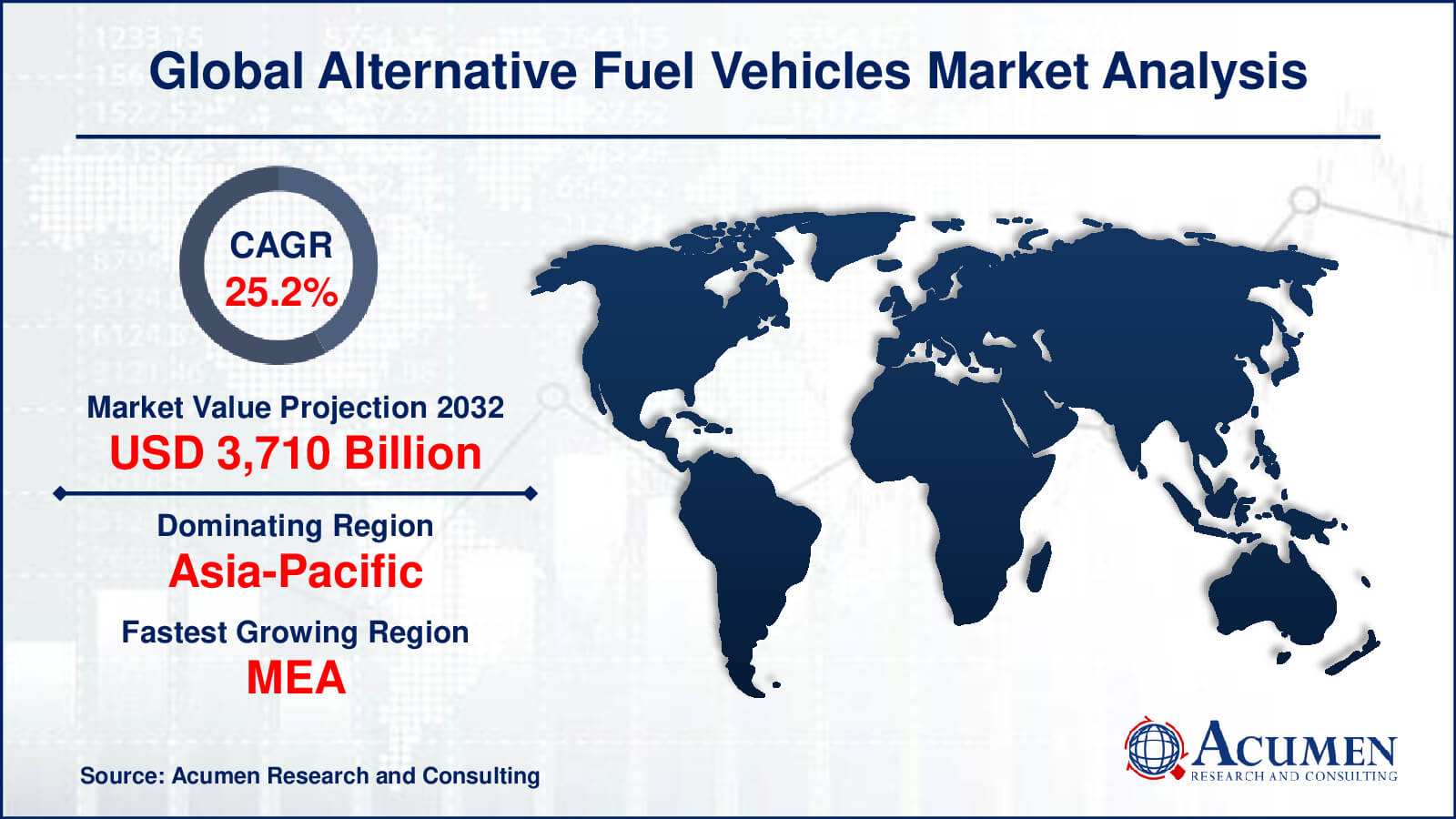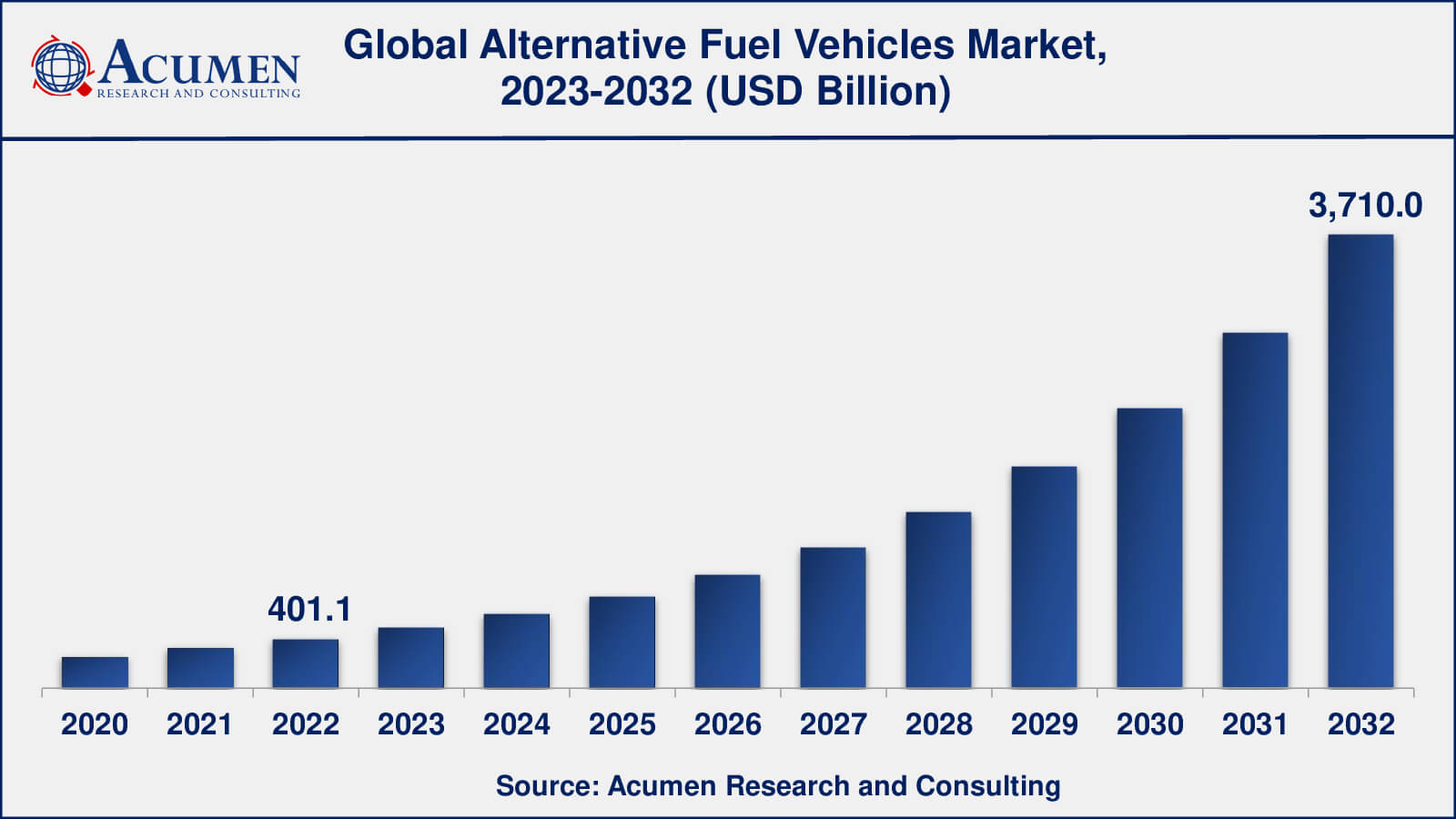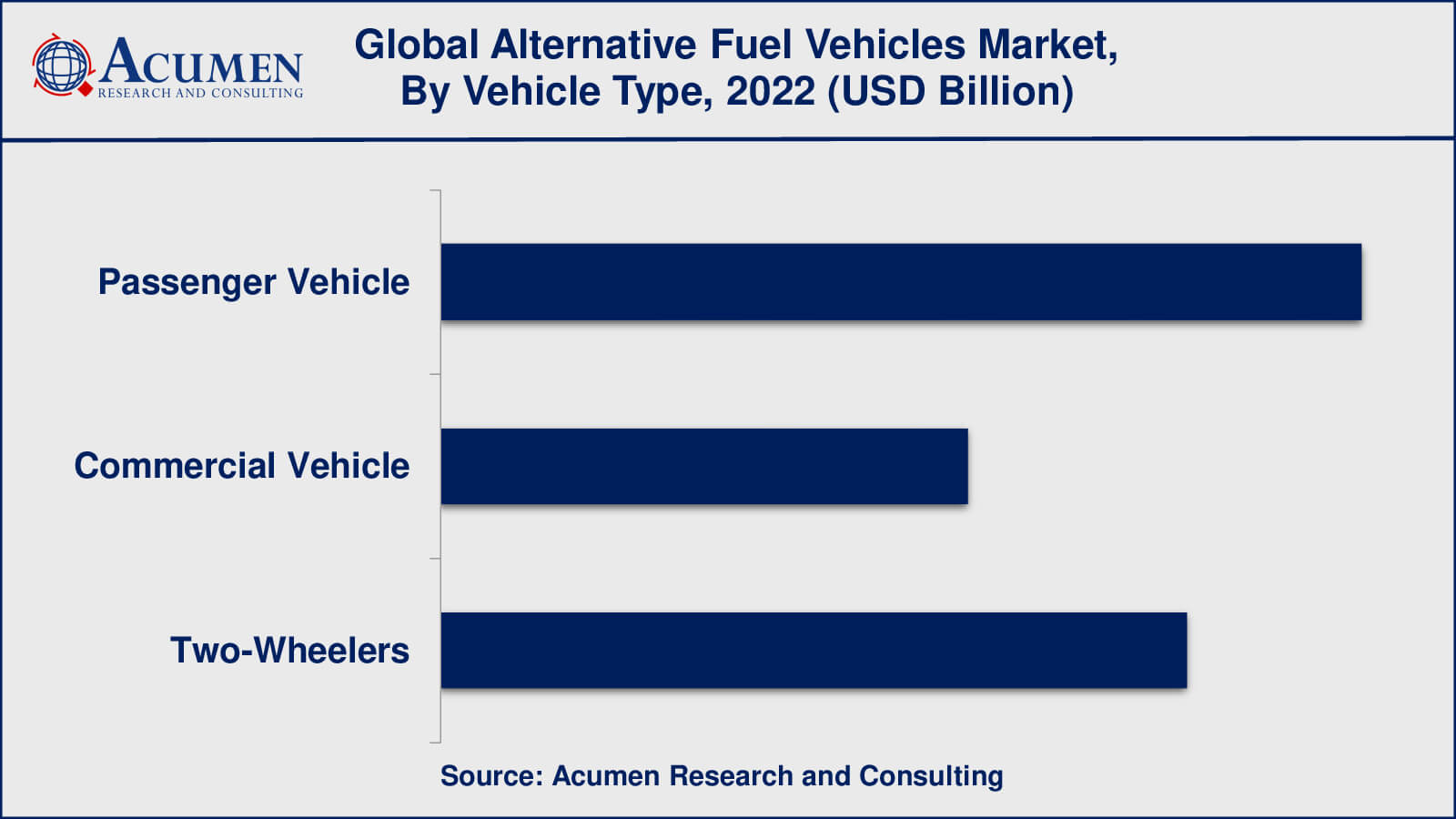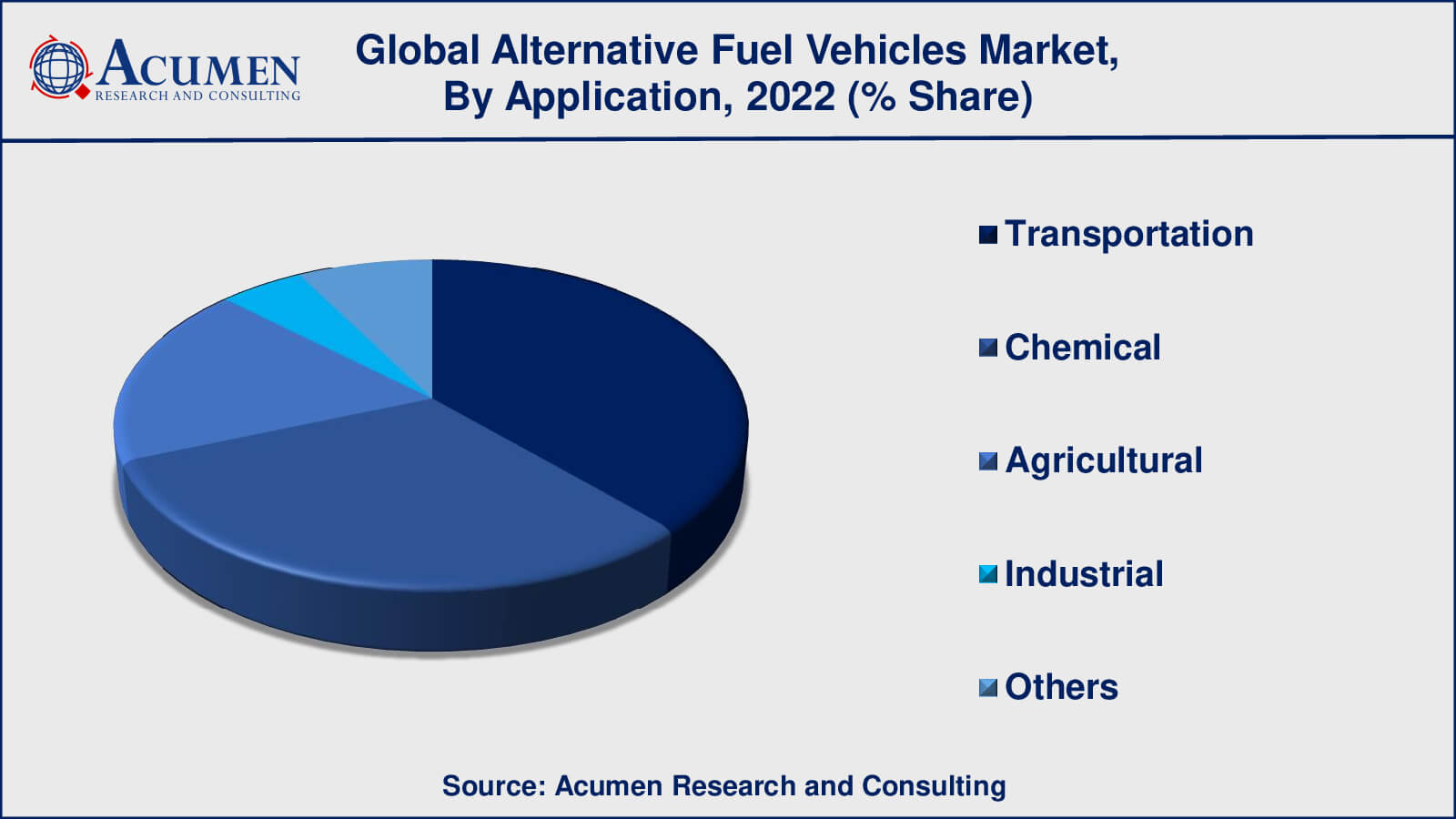Alternative Fuel Vehicles Market | Acumen Research and Consulting
Alternative Fuel Vehicles Market Size - Global Industry, Share, Analysis, Trends and Forecast 2023 - 2032
Published :
Report ID:
Pages :
Format :
The Alternative Fuel Vehicles Market Size collected USD 401.1 Billion in 2022 and is set to achieve a market size of USD 3,710 Billion in 2032 growing at a CAGR of 25.2% from 2023 to 2032.
Alternative Fuel Vehicles Market Report Statistics
- Global alternative fuel vehicles market revenue is estimated to reach USD 3,710 billion by 2032 with a CAGR of 25.2% from 2023 to 2032
- Asia-Pacific alternative fuel vehicles market value occupied more than USD 200 billion in 2022
- The Middle East & Africa alternative fuel vehicles market growth will record a CAGR of around 25% from 2023 to 2032
- Among vehicle type, the passenger vehicles sub-segment generated around 42% share in 2022
- Based on application, the passenger vehicles generated more than US $ 152 billion revenue in 2022
- Increasing diversity of alternative fuel vehicles is a popular alternative fuel vehicles market trend that fuels the industry demand

The demand for conventional fuel has always been on the rise due to widespread usage among consumers across the globe. However, conventional fuel is a major concern for environmental hazards. Due to this reason, countries such as the U.S. and Italy are focusing on alternate forms of fuel in order to cater to the demand from consumers. The major reason for this switch is to reduce the dependency of imports on foreign countries, which creates a burden on the economy. Fluctuations in fuel prices have affected the world economy and in order to avoid any further negative effects, many countries are focusing on reducing their usage of conventional fuel.

Global Alternative Fuel Vehicles Market Dynamics
Market Drivers
- Increasing concerns over climate change
- Favorable government support
- Consumer awareness and demand
- Focus on sustainable materials and manufacturing
Market Restraints
- High upfront costs
- Limited model options
- Lack of infrastructure
Market Opportunities
- Increasing adoption of electric vehicles (EVs)
- Growing market for hydrogen fuel cell vehicles (HFCVs)
- Expansion of charging infrastructure
Alternative Fuel Vehicles Market Report Coverage
| Market | Alternative Fuel Vehicles Market |
| Alternative Fuel Vehicles Market Size 2022 | USD 401.1 Billion |
| Alternative Fuel Vehicles Market Forecast 2032 | USD 3,710.0 Billion |
| Alternative Fuel Vehicles Market CAGR During 2023 - 2032 | 25.2% |
| Alternative Fuel Vehicles Market Analysis Period | 2020 - 2032 |
| Alternative Fuel Vehicles Market Base Year | 2022 |
| Alternative Fuel Vehicles Market Forecast Data | 2023 - 2032 |
| Segments Covered | By Fuel Type, By Vehicle Type, By Application, And By Geography |
| Regional Scope | North America, Europe, Asia Pacific, Latin America, and Middle East & Africa |
| Key Companies Profiled | AUDI AG, BMW Group, Daimler AG, Ford Motor Company, General Motors, Honda Motor Co., Ltd., Mitsubishi Motors Corporation, Nissan Motor Corporation, Nikola Motor Company, Renault, Tata Motors, Tesla Motors, Toyota Motor Corporation, and Volkswagen AG. |
| Report Coverage |
Market Trends, Drivers, Restraints, Competitive Analysis, Player Profiling, Covid-19 Analysis, Regulation Analysis |
Alternative Fuel Vehicles Market Growth Factors
The global alternative fuel vehicles market is driven by the increasing demand for green vehicles. Green vehicles are powered by alternate options such as electric, solar, and hybrid. Such vehicles are suitable for fighting global warming issues. Eco-friendliness is another major factor driving the demand for vehicles with alternative fuel. Due to the increasing pollution level across the globe, manufacturers are increasingly stressing towards usage of alternative fuel in order to curb the issue. Consumers are showing increased preference towards such vehicles as well due to rising prices of conventional fuel.
The low market presence of alternative fuel is the major factor hindering the growth of the alternative fuel vehicle market. Awareness about alternative fuels is very low in developing regions which is the major factor for the low growth of this market. However, the impact of this factor is analyzed to subside during the forecast period. Further, the performance of vehicles using alternative fuel is less compared to their conventional counterparts. Hence consumers preferring high performance would opt for vehicles with conventional fuel. Hence, this factor is highly restraining the growth of the alternative fuel vehicles market at present.
Alternative Fuel Vehicles Market Segmentation
The worldwide alternative fuel vehicles market is categorized based on fuel type, vehicle type, application, and geography.
Alternative Fuel Vehicles Market By Fuel Type
- Electric Vehicles (EVs)
- Hydrogen Fuel Cell Vehicles (HFCVs)
- Biofuel Vehicles
- Natural Gas Vehicles (NGVs)

According to the alternative fuel vehicles market forecast, electric vehicle sub-segment is expected to lead the market from 2023 to 2032. EVs have grown in popularity in recent years, thanks to advances in battery technology, increased range, and government support. According to the International Energy Agency (IEA), despite the economic slowdown caused by the COVID-19 pandemic, global EV sales will increase by 41% in 2020. While hydrogen fuel cell vehicles (HFCVs) and natural gas vehicles (NGVs) are growing, their market share remains small in comparison to EVs. HFCVs face challenges due to a lack of hydrogen fueling infrastructure, whereas NGVs face challenges due to a lack of natural gas refuelling infrastructure. Biofuel vehicles, which run on renewable fuels like ethanol and biodiesel, have a smaller market share than EVs. However, biofuels are expected to play an important role in transportation decarbonization, particularly in the aviation and marine industries, where alternatives to liquid fuels are limited.
Alternative Fuel Vehicles Market By Vehicle Type
- Passenger Vehicle
- Commercial Vehicle
- Two-Wheelers
As of 2021, passenger vehicles held the majority of the market share for alternative fuel vehicles. This is due to the fact that passenger vehicles account for the majority of the automotive market and are typically the first to adopt new technologies. Electric vehicles (EVs) are the most popular alternative fuel passenger vehicle, with EV sales rapidly increasing in recent years. According to the International Energy Agency (IEA), electric vehicles will account for approximately 4.2% of global vehicle sales in 2020. Commercial vehicles, such as trucks and buses, are also growing in the alternative fuel vehicle market, particularly in natural gas and hydrogen fuel cell technology. However, commercial vehicles continue to have a small market share in comparison to passenger vehicles. Electric scooters and motorcycles are also gaining popularity in some markets, particularly in Asia. However, two-wheelers continue to have a small market share in comparison to passenger vehicles and commercial vehicles.
Alternative Fuel Vehicles Market By Application
- Transportation
- Chemical
- Agricultural
- Industrial
- Others

The transportation sector accounts for the lion's share of the market for alternative fuel vehicles. This is due to the fact that transportation is the single largest contributor to global greenhouse gas emissions, and cutting emissions from the transportation sector is critical for meeting climate change targets. Electric vehicles, hydrogen fuel cell vehicles, and biofuel vehicles are examples of alternative fuel vehicles that can help reduce emissions from the transportation sector. Passenger vehicles are the most common application segment for alternative fuel vehicles in the transportation sector, accounting for the majority of the automotive market. Commercial vehicles, such as trucks and buses, are also growing in the alternative fuel vehicle market, particularly in natural gas and hydrogen fuel cell technology.
Alternative Fuel Vehicles Market Regional Outlook
North America
- U.S.
- Canada
Europe
- U.K.
- Germany
- France
- Spain
- Rest of Europe
Asia-Pacific
- India
- Japan
- China
- Australia
- South Korea
- Rest of Asia-Pacific
Latin America
- Brazil
- Mexico
- Rest of Latin America
The Middle East & Africa
- South Africa
- GCC Countries
- Rest of the Middle East & Africa (ME&A)
Alternative Fuel Vehicles Market Regional Analysis
North America is a prime region for alternative fuels as the U.S. government has supported the urgency to control its emissions. Further, North America is aiming at reducing their dependency on the import of conventional fuels which is likely to boost the market for alternative fuels in North America. Europe holds a significant share in the global alternative fuel vehicles market due to increased support from regulating bodies based in Europe. Italy serves as one of the biggest market for alternative fuel vehicles. Asia-Pacific is expected to witness a rapid growth during the forecast period due to increasing pollution. The Chinese government is offering lucrative incentive for buyers of alternative fuel vehicles which is complementing the growth of the market. Further, owing to the recent pollution related incidents in India, the government is undergoing a plan to bring in alternative fuel vehicles in the market in order to curb the growing issue regarding pollution.
Alternative Fuel Vehicles Market Players
Some of the global alternative fuel vehicles companies profiled in the report include AUDI AG, BMW Group, Daimler AG, Ford Motor Company, General Motors, Honda Motor Co., Ltd., Mitsubishi Motors Corporation, Nissan Motor Corporation, Nikola Motor Company, Renault, Tata Motors, Tesla Motors, Toyota Motor Corporation, and Volkswagen AG.
Frequently Asked Questions
How big is the alternative fuel vehicles market?
The alternative fuel vehicles market size was USD 401.1 Billion in 2022.
What is the CAGR of the global alternative fuel vehicles market during forecast period of 2023 to 2032?
The CAGR of alternative fuel vehicles market is 25.2% during the analysis period of 2023 to 2032.
Which are the key players operating in the market?
The key players operating in the global market are AUDI AG, BMW Group, Daimler AG, Ford Motor Company, General Motors, Honda Motor Co., Ltd., Mitsubishi Motors Corporation, Nissan Motor Corporation, Nikola Motor Company, Renault, Tata Motors, Tesla Motors, Toyota Motor Corporation, and Volkswagen AG.
Which region held the dominating position in the global alternative fuel vehicles market?
Asia-Pacific held the dominating position in alternative fuel vehicles market during the analysis period of 2023 to 2032.
Which region registered the fastest growing CAGR for the forecast period of 2023 to 2032?
MEA region exhibited fastest growing CAGR for alternative fuel vehicles market during the analysis period of 2023 to 2032.
What are the current trends and dynamics in the global alternative fuel vehicles market?
The current trends and dynamics in the alternative fuel vehicles industry include increasing concerns over climate change, favorable government support, and consumer awareness and demand.
Which fuel type held the maximum share in 2022?
The electric vehicles (EVs) fuel type held the maximum share of the alternative fuel vehicles market.



